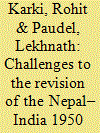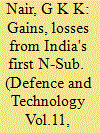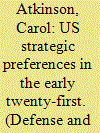|
|
|
Sort Order |
|
|
|
Items / Page
|
|
|
|
|
|
|
| Srl | Item |
| 1 |
ID:
139294


|
|
|
|
|
| Summary/Abstract |
The contemporary strategic and political environment has gone through tremendous changes in comparison to the context in which the 1950 treaty was signed. The Indian prime minister Narendra Modi’s August 2014 visit to Nepal, the first by an Indian prime minister in 17 years, has rekindled the hope of improving Nepal–India relations, including revision of the 1950 treaty. Against this backdrop, this article argues that without understanding India’s strategic, security-related and political concerns, revision of the 1950 treaty is highly unlikely. The article further argues that by identifying and addressing the key challenges, both countries can develop a shared strategic vision which in turn can provide an enhanced framework for the revision of the 1950 treaty and further strengthen the ‘special’ Nepal–India relationship in the changed strategic context of the 21st century.
|
|
|
|
|
|
|
|
|
|
|
|
|
|
|
|
| 2 |
ID:
129343


|
|
|
|
|
| Publication |
2012.
|
| Summary/Abstract |
the induction of the nuclear powered chakra submarine on wet lease from Russia from 1987 to 1991, it was the prelude to the political and strategic vision to embark on a blue water underwater capability akin to the developed countries. However the vision was compulsively short closed owing to the changed political leadership in India and the breakup of the Soviet Union.
|
|
|
|
|
|
|
|
|
|
|
|
|
|
|
|
| 3 |
ID:
147290


|
|
|
|
|
| Summary/Abstract |
The Justice and Development Party’s (AKP) policymakers have aimed to position Turkey as the leader of the Middle East by assessing its soft power since they came to power. Drawing on Strategic Depth of Ahmet Davutoğlu, Prime Minister of Turkey, this article attempts to offer a critical constructivist, postcolonial and feminist analysis of Turkey’s recent foreign policy discourse in the region by showing how the myth of leadership is constitutive, and is constituted by Davutoğlu’s discourses on women/femininities and men/masculinities. The leadership is imagined by localising Enlightenment notions of masculinity through a re-reading of local traditions, namely Ottoman history and Islam. In doing so, Strategic Depth aims to feminise Turkey’s imagery without necessarily putting it out of the masculinity continuum. As such, Turkey mimics the West but differs from it so as to perpetuate a good masculinity over the people of the Middle East. Implicit in such an imagery, the text distinguishes itself from the competing self-perceptions (and masculinities) in the country, namely the Kemalist one. I further argue that this imagery underlies the recent hypermasculinisation of politics within and beyond the country when political elites feel threatened in the face of political crises.
|
|
|
|
|
|
|
|
|
|
|
|
|
|
|
|
| 4 |
ID:
157000


|
|
|
|
|
| Summary/Abstract |
At the last moment when this issue was ready to go to the printer, U.S. President Donald Trump came out with his statement officially recognizing Jerusalem as the capital of the State of Israel and instructing the U.S. State Department to move the embassy from Tel Aviv to Jerusalem. The statement will have a far-reaching impact on efforts to achieve a political settlement between the Israelis and the Palestinians, and therefore requires a clear, immediate response before it’s too late. President Trump’s decision lacks any international legitimacy or legal justification.
|
|
|
|
|
|
|
|
|
|
|
|
|
|
|
|
| 5 |
ID:
094596


|
|
|
| 6 |
ID:
138746


|
|
|
|
|
| Summary/Abstract |
The Obama administration is often criticized for not having a strategic vision. After more than six years in office, a high expectation that was widely shared around the globe seems to have nearly evaporated. Many see the “disorder” the world is facing today as partly a result of a lack of vision from the White House. You could make a case that the emergence of the Islamic State (IS) and other “violent extremism” in the Middle East and beyond, Russia's aggression in Ukraine, chaos in Syria, China's assertive moves in the East China Sea and South China Sea, and so forth, are results, direct and indirect, of a perceived vacuum created by “American withdrawal.” However, the Obama administration's understanding of the world has been surprisingly positive and constant. This paper will argue that Obama administration in fact has a core world view, based on a new self-image of the United States, and that the issue is not whether the administration lacks a vision; rather the focus should be on the vision itself and the execution of that vision.
|
|
|
|
|
|
|
|
|
|
|
|
|
|
|
|
| 7 |
ID:
137937


|
|
|
|
|
| Summary/Abstract |
This article investigates how US national security planners have envisioned the emerging strategic environment during the early twenty-first century and evaluates how their perceptions of this strategic environment have changed during these years. This conceptual evolution can be seen in how defense planners define threats, identify defense priorities, and design security strategies. Five key strategic planning documents serve as the basis for this analysis and illustrate significant shifts in how the US government has envisioned its own security requirements as well as the context within which its strategic vision will need to be realized. These planning documents are: (1) Joint Vision 2020, (2) the Bush Administration’s 2002 National Security Strategy of the United States, (3) the Obama Administration’s 2010 National Security Strategy, (4) US Strategic Defense Guidance entitled Sustaining US Global Leadership: Priorities for 21st Century Defense, and (5) the US Chairman of the Joint Chiefs of Staff’s Capstone Concept for Joint Operations: Joint Force 2020.
|
|
|
|
|
|
|
|
|
|
|
|
|
|
|
|
|
|
|
|
|